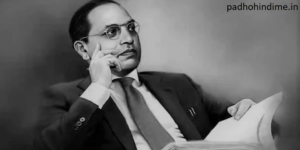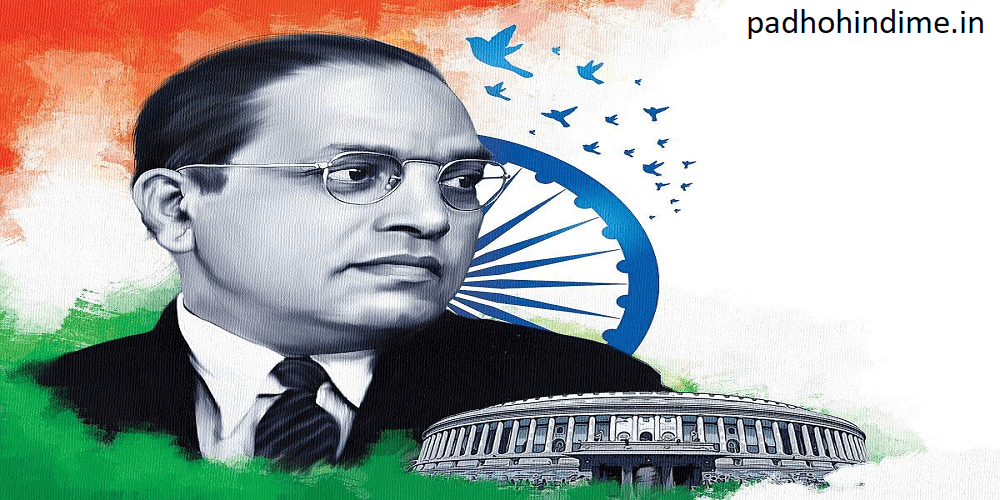Biography Of Dr. B. R. Ambedkar
Dr. Bhimrao Ramji Ambedkar, popularly known as Dr. B.R. Ambedkar, was an eminent Indian jurist, economist, politician, and social reformer. He dedicated his life to fighting against social discrimination and championing the rights of the marginalized communities in India, particularly the Dalits (formerly known as untouchables). Dr. Ambedkar played a pivotal role in drafting the Constitution of India and was the chief architect of the Indian Constitution. His relentless efforts to eradicate caste-based discrimination and ensure social justice have made him one of the most influential figures in Indian history. This biography will provide an in-depth exploration of Dr. B.R. Ambedkar’s life and his contributions to Indian society.
Early Life and Education: Bhimrao Ramji Ambedkar was born on April 14, 1891, in the town of Mhow in the Central Provinces (present-day Madhya Pradesh), India. He belonged to the Mahar caste, which was considered an “untouchable” or lower-caste community. Dr. Ambedkar faced social discrimination and untouchability from an early age, which deeply influenced his worldview and motivated his lifelong struggle for equality.
Despite facing severe hardships, Ambedkar excelled in academics. He obtained a scholarship and pursued higher education at Elphinstone College in Bombay (now Mumbai). He later moved to the United States for further studies and enrolled at Columbia University in New York, where he earned multiple degrees, including a doctorate in economics. Dr. Ambedkar’s education abroad exposed him to various socio-political ideologies, shaping his understanding of social justice and human rights.
Struggle against Discrimination: Upon his return to India, Dr. B.R. Ambedkar witnessed firsthand the pervasive caste-based discrimination prevalent in Indian society. He dedicated his life to combating social inequality and uplifting the marginalized communities. In 1924, he founded the Bahishkrit Hitakarini Sabha (Outcastes Welfare Association) to address the issues faced by Dalits.
Ambedkar actively campaigned against untouchability, fought for the rights of Dalits to access public spaces, and advocated for inter-caste marriages. He organized public movements and led several marches, challenging the orthodoxy of the caste system. In 1936, he led the Mahad Satyagraha, a significant protest demanding the right of Dalits to access water from the public tank in Mahad, Maharashtra. This event marked a crucial turning point in the struggle against untouchability.

Drafting the Indian Constitution: Dr. B.R. Ambedkar’s most enduring contribution to Indian society was his pivotal role in drafting the Constitution of India. As the chairman of the Constitution Drafting Committee, he played a crucial role in shaping the foundational document of independent India. Ambedkar ensured that the Constitution enshrined principles of equality, justice, and individual rights.
His vision for a modern, egalitarian society led him to advocate for reservations and affirmative action for the socially disadvantaged groups. Article 15 of the Indian Constitution, which prohibits discrimination based on caste, religion, race, sex, or place of birth, is a testament to his commitment to social justice.
Political Career and Legacy: Dr. Ambedkar’s impact extended beyond social reform and constitutional drafting. He was also a prominent political leader. In 1937, he formed the Independent Labour Party and successfully contested elections to become a member of the Bombay Legislative Assembly. Ambedkar became the Minister of Labour and held various other ministerial portfolios in the government.
After India gained independence in 1947, Dr. Ambedkar was appointed as India’s first Minister of Law and Justice in the cabinet of Prime Minister Jawaharlal Nehru. He played a crucial role in formulating laws and policies to safeguard the rights of the marginalized communities.
Ambedkar’s contribution to the upliftment of Dalits and his relentless pursuit of social justice earned him immense respect and admiration from millions of Indians. He remains an iconic figure and a source of inspiration for countless individuals fighting against social discrimination and inequality.
Dr. Ambedkar’s struggles and achievements were not limited to his lifetime. His ideas continue to shape Indian society. The Constitution of India, with its emphasis on social justice and equality, stands as a testament to his vision. His teachings and philosophy have influenced various movements and leaders advocating for the rights of marginalized communities.
Dr. B.R. Ambedkar passed away on December 6, 1956, but his legacy lives on. His contributions to India’s social, political, and legal landscape have been instrumental in fostering a more inclusive and equitable society. The principles of justice and equality that he championed continue to guide India’s ongoing journey towards a more just and egalitarian society, and his work serves as a constant reminder of the need to strive for a society free from discrimination and oppression.




